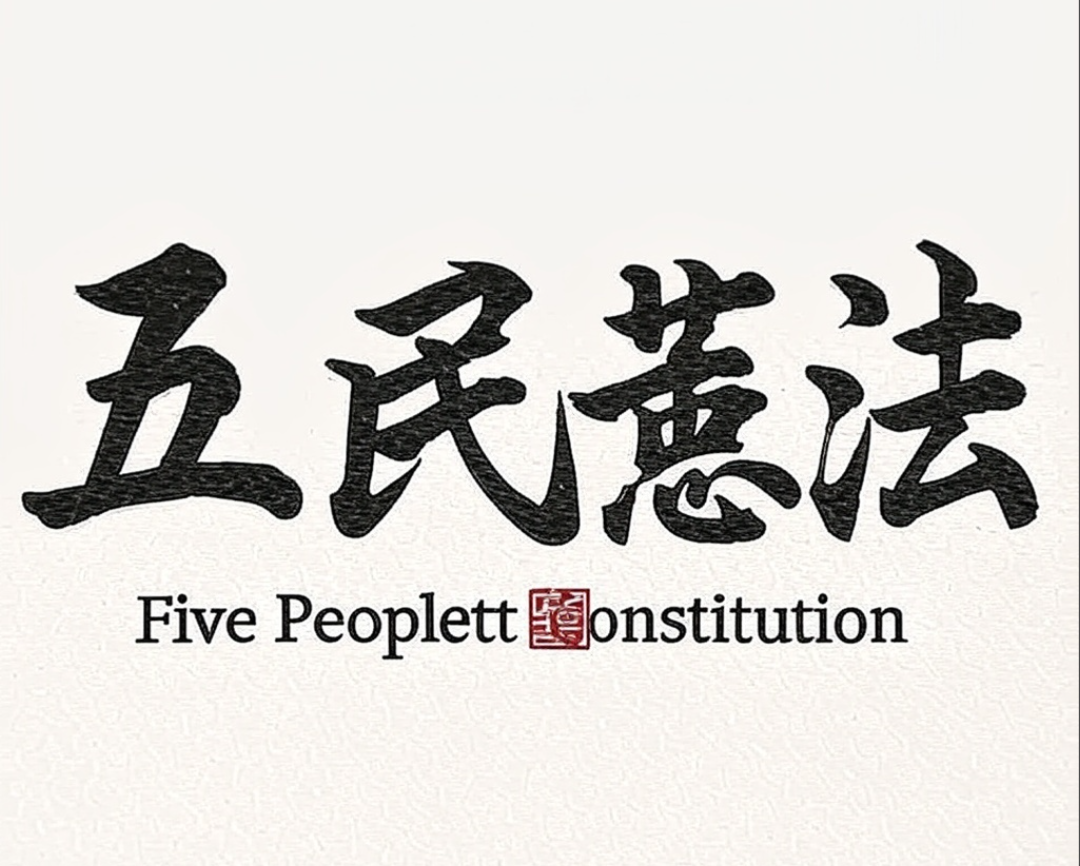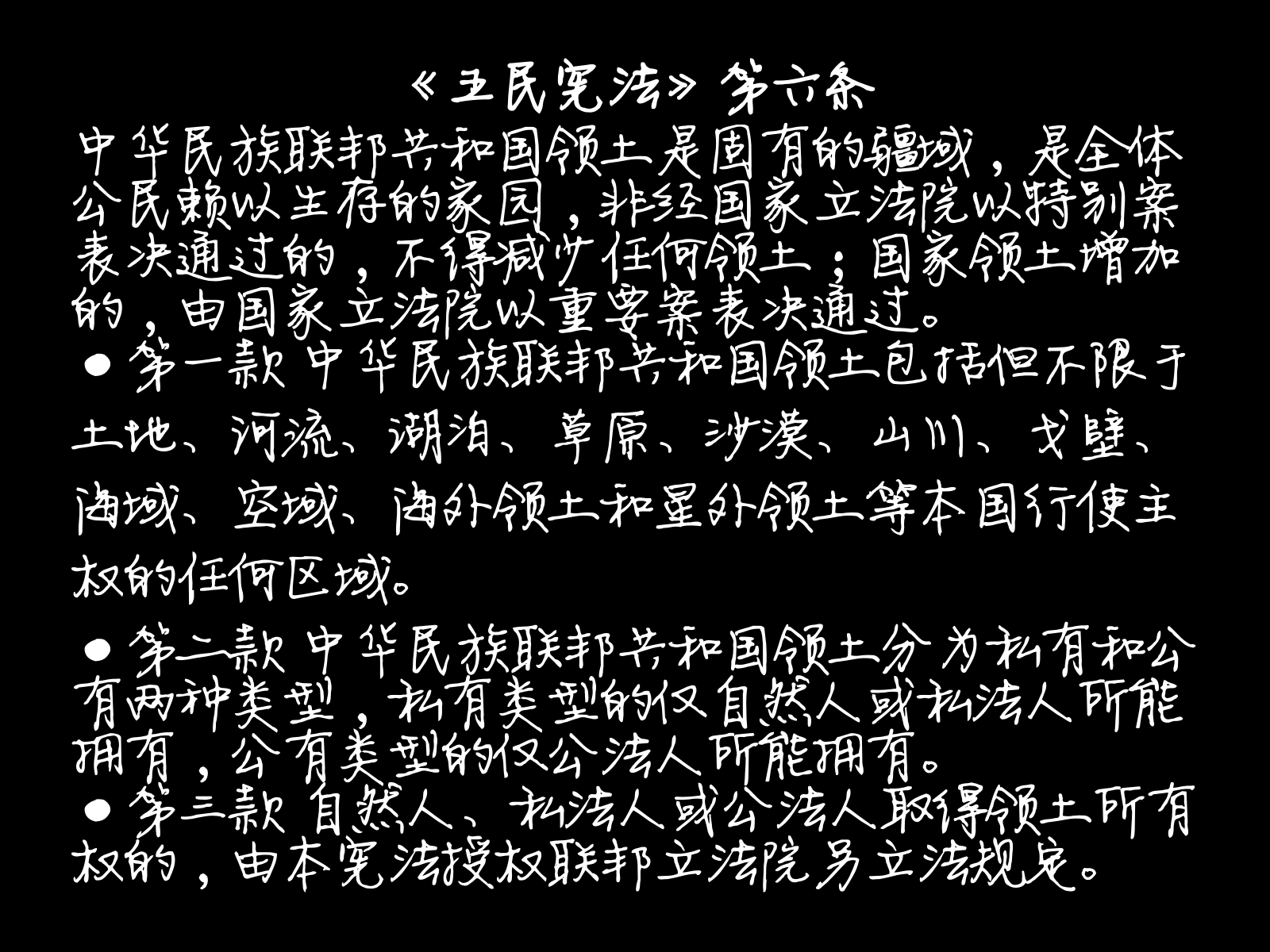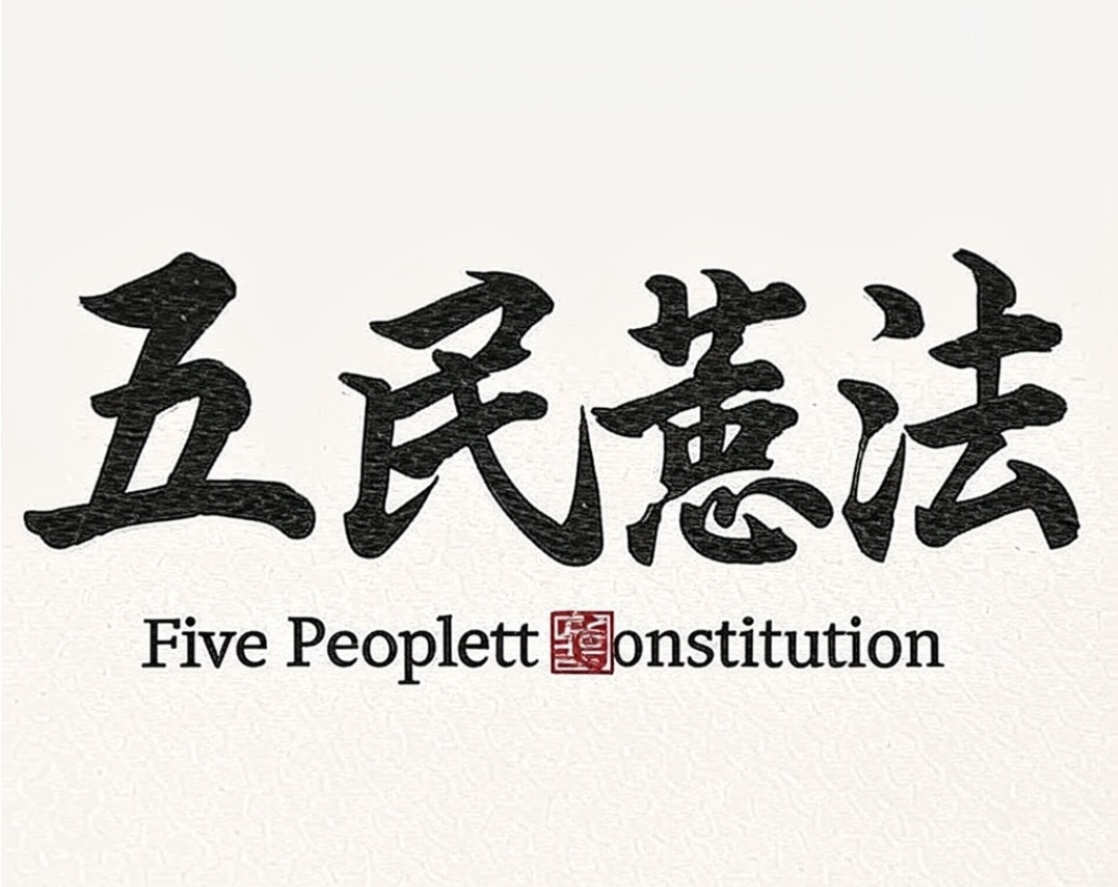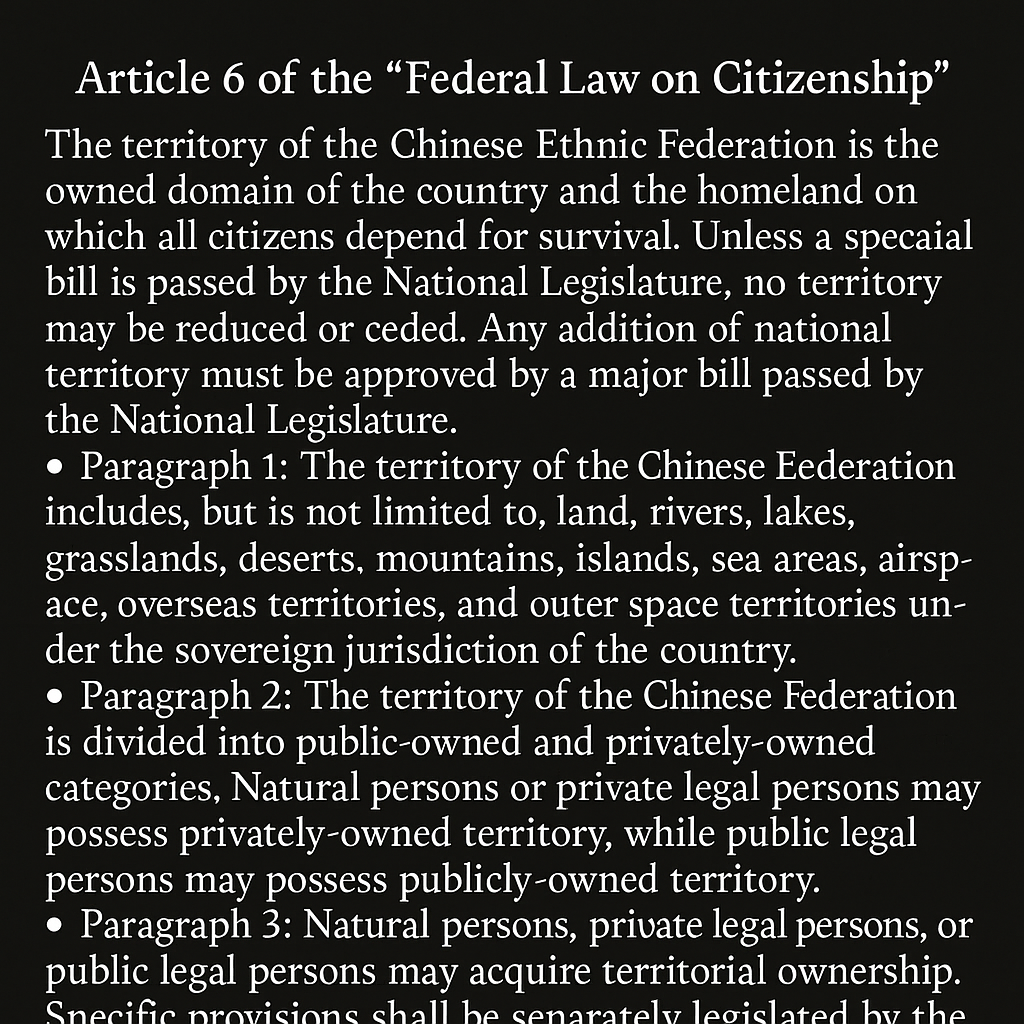宪法第六条:保障国家领土的完整
作者:何清风
编辑:程铭 责任编辑:罗志飞
翻译:何兴强
引言:
宪法作为国家的基本法,其意义在于背后所承载的思想体系与治理逻辑。本宪法第五条所规定的,是国家领土的性质、范围以及归属方式,这一条款涵盖了国家存续与主权完整的根本保障。倘若没有清晰的领土观念,国家便无法更好的维护公民赖以生存的空间,若缺乏合理的领土制度设计,终将导致主权领土的丧失,以及成为政客交易的筹码。因此,本条是奠定国家领土基础的重要法理依据。

一、领土的神圣性与不可侵犯性
本条开篇即言:“中华民族联邦共和国领土是固有的疆域,是全体公民赖以生存的家园,非经国家立法院以特别案表决通过的,不得减少任何领土。”这一条款明确两层含义:
其一,领土是“固有疆域”,并非可随意分割或放弃的交易物,国家的疆域从历史与现实中延续而来,承载着无数代人的耕耘、文化与生存记忆。将其定义为“固有”,意味着领土不是某一届政府的私产,而是全体公民的共同家园。
其二,任何对领土的减少必须经过“特别案表决”。特别案不同于一般性法案,其门槛更高,代表程序更严谨,不仅要在立法院获得通过,且表决程序包括公民投票表决。这体现了宪法作为全体公民相互之间的契约,对领土完整负有共同的责任与相同的权利,避免因政府官员的外交妥协与私利而轻易割让。

二、领土增加的程序与意义
条文又规定:“国家领土增加的,由国家立法院以重要案表决通过。”这里形成了与“减少”相对应的逻辑。减少需要“特别案”,增加则需要“重要案”。无论是在制度层面还是现实当中,领土并非静止不变的,而是可以因历史发展、民族意志、国际合作甚至宇宙开拓而不断扩展,故对增加领土作出规定,以适应未来国家发展的需求。
为何增加时只需“重要案”而非“特别案”?原因在于扩展疆域通常符合国家利益,能够带来资源与安全的提升,不存在损害民族根本利益的危险。但与此同时,仍需立法院审慎决议,以避免盲目扩张带来的治理风险或国际冲突。制度的设计既强调疆域稳固,又保留了未来发展的余地。
三、第一款的解析:领土的全域性
第一款列举了国家领土的范围:“包括但不限于土地、河流、湖泊、草原、沙漠、山川、戈壁、海域、空域、海外领土和星外领土等本国行使主权的任何区域。”此条款的设计主要有以下三个要点:
全面性:从传统的陆地、河流到现代的空域、海域,几乎囊括一切地理空间,避免出现模糊地带,也为后续立法提供了法条参考。
前瞻性:特别的提出“海外领土和星外领土”,这是对未来空间探索与外太空主权问题的预先回应,宪法并未局限于现有地理空间,而是将眼光投射到星际文明层面,这也是人类在可预见的未来终将实现的。
主权核心:关键在于“本国行使主权的任何区域”。换言之,领土的本质并不单在物理地理的范围,而在于主权的有效实施。无主权之地,纵有疆域之形,亦非国土;有主权之地,即便远在星外,也属于国家的合法疆域。
四、第二款的解析:领土的所有权类型
第二款规定:“中华民族联邦共和国领土分为私有和公有两种类型,私有类型的仅自然人或私法人所能拥有,公有类型的仅公法人所能拥有。”
此处是五民宪法的独创性所在。传统宪法大多将“领土”与“国家”直接绑定,极少涉及领土所有权的多样化。而本宪法将领土区分为“私有”和“公有”,这与五民宪法整体强调公民权利与多元主体治理的理念高度一致。
私有土地:指可被自然人或私法人合法取得的土地、地产等。这里不仅是承认私人财产权,更是将其提升为“领土权”。所谓“领土权”即公民拥有国家领土的权利,这与“国家是公民的国家,是公民建立国家”的理念是高度一致的,国家是全体公民共同组建的,国家领土则自然是公民所拥有的。
公有土地:作为一个“地大物博”的国家,其领土是广袤的,对于非公民所有的土地,以及对于一些公权机构所属的土地,设为公有土地,以规范国家领土的管理工作,明确所有权的边界,实现公共利益与个人权利的相对平衡。
五、第三款的解析:立法授权与制度弹性
第三款规定:“自然人、私法人或公法人取得领土所有权的,由本宪法授权联邦立法院另立法规定。”此款承上启下,将具体的领土所有权规则留给立法机关去细化。这种安排有两重意义:
宪法的原则性:宪法只规定基本框架,不陷入细节,避免过早僵化和条款臃肿。
制度的弹性:随着社会发展、经济结构和科技变迁,领土的性质与归属形式可能不断变化。比如太空海洋的开发等,而且,作为一个“地大物博”的联邦制国家,各地区的情况不尽相同,这些都需要在未来通过立法来动态调整。
六、历史与现实的结合
五民宪法第五条不仅是对领土的规定,更是一种历史经验的总结。中华民族在近代曾因割地赔款而饱受屈辱,领土问题在民族记忆中留下了深刻伤痕。因此,本条强调“不得减少”与严格程序,正是防止悲剧重演的制度保障。
同时,当今世界正处于新一轮科技革命与地缘竞争之中。海洋权益、极地通道、太空资源等正在成为新的博弈焦点。五民宪法前瞻性地纳入“星外领土”,使国家在未来国际秩序重构中占据了法律与战略的先机。
七、结语
宪法第五条,写下的不只是疆域的范围,更是国家存在的尊严与未来拓展的方向。国家领土既是先辈们的遗产,也是后世子孙的根基;既是物质的疆土,也是民族精神的边界。唯有守护这一疆域,民族才能真正实现自由、民主、平等与和谐的理想。
——“五民主义”奠基人、《五民宪法》撰写人何清风,一身正气、两袖清风。
On the Future of Chinese Democracy: A Detailed Explanation of the “Five-People Constitution” – Part 8
Article 6 of the Constitution: Safeguarding the Integrity of National Territory
Author: He Qingfeng
Editor: Cheng Ming Executive Editor: Luo Zhifei
Translator:He XingQiang
Abstract: The Five-People Constitution defines national territory as “inherent domain,” not a commodity that can be arbitrarily divided or surrendered. The nation’s territory is an inheritance of history and reality, carrying the cultivation, culture, and survival memory of countless generations. Moreover, the Constitution distinguishes territory into “private” and “public” ownership, which aligns closely with its broader emphasis on citizens’ rights and pluralistic governance.
Introduction
As the fundamental law of the state, the Constitution embodies the underlying system of thought and governance logic. Article 6 prescribes the nature, scope, and ownership of the nation’s territory. This clause provides the fundamental guarantee for the state’s survival and sovereignty. Without a clear territorial concept, the state cannot effectively safeguard the citizens’ living space; without a rational territorial system, sovereignty would eventually be lost, and territory might become a bargaining chip for politicians. Thus, this article is an essential legal foundation for national territory.
I. The Sanctity and Inviolability of Territory
The article opens: “The territory of the Federal Republic of the Chinese Nation is inherent domain, the homeland upon which all citizens depend for survival. Unless passed by a special resolution of the National Legislature, no reduction of territory shall be permitted.”
This statement has two key implications:
Territory is “inherent domain,” not a tradable commodity that can be arbitrarily divided or surrendered. The nation’s boundaries are rooted in history and reality, carrying the toil, culture, and survival memory of generations. By defining territory as “inherent,” it means that land is not the private property of any administration but the shared homeland of all citizens.
Any reduction of territory requires a “special resolution.” Unlike ordinary bills, a special resolution has higher thresholds and stricter procedures, including approval by the National Legislature and a referendum. This reflects the Constitution as a social contract among all citizens, making the integrity of territory a shared responsibility and right, thereby preventing concessions or cessions caused by government officials’ diplomatic compromises or private interests.
II. The Procedure and Significance of Territorial Expansion
The article further states: “Any addition of national territory must be approved by a major resolution of the National Legislature.”
Here lies a parallel logic: reduction requires a “special resolution,” while expansion requires a “major resolution.”
Territory is not static but may expand through historical development, national will, international cooperation, or even cosmic exploration. Therefore, the Constitution allows for expansion to meet future needs.
Why is expansion subject to a “major resolution” rather than a “special resolution”? Because expansion usually benefits the nation, enhancing resources and security without undermining fundamental national interests. Nevertheless, legislative approval is required to prevent reckless expansion that could cause governance challenges or international conflict. The system emphasizes stability while preserving flexibility for future development.
III. Analysis of Paragraph 1: The Comprehensive Scope of Territory
Paragraph 1 enumerates national territory: “Including but not limited to land, rivers, lakes, grasslands, deserts, mountains, plateaus, sea areas, airspace, overseas territories, and extraterrestrial territories under the sovereign jurisdiction of the country.”
This provision reflects three aspects:
Comprehensiveness: From traditional domains such as land and rivers to modern domains like airspace and seas, virtually all geographic spaces are included, preventing ambiguities and offering reference for future legislation.
Foresight: The mention of “overseas territories and extraterrestrial territories” anticipates future issues of space exploration and sovereignty beyond Earth, projecting vision toward interstellar civilization.
Core of Sovereignty: The key lies in “any region under the sovereign jurisdiction of the country.” Territory is not defined by geography alone but by the exercise of sovereignty. Land without sovereignty, though physically possessed, is not true territory; land with sovereignty, even beyond Earth, is legitimate national domain.
IV. Analysis of Paragraph 2: Types of Territorial Ownership
Paragraph 2 provides: “The territory of the Federal Republic of the Chinese Nation is divided into private and public ownership. Private ownership may be held only by natural persons or private legal persons, while public ownership may be held only by public legal persons.”
This is a distinctive innovation of the Five-People Constitution. Traditional constitutions bind “territory” directly to “the state,” seldom diversifying territorial ownership. By dividing territory into “private” and “public,” the Constitution aligns with its overall emphasis on citizens’ rights and pluralistic governance.
Private Territory: Refers to land or property lawfully acquired by natural persons or private legal entities. This not only acknowledges private property rights but elevates them to the status of “territorial rights.” Such rights embody the principle that “the state belongs to its citizens, and citizens establish the state.” Thus, national territory is naturally also citizens’ territory.
Public Territory: Given the vastness of the nation, lands not privately owned or belonging to public institutions are designated as public territory. This clarifies ownership boundaries, regulates management, and balances public interests with individual rights.
V. Analysis of Paragraph 3: Legislative Authorization and Flexibility
Paragraph 3 states: “The acquisition of territorial ownership by natural persons, private legal persons, or public legal persons shall be determined by separate legislation enacted by the National Legislature under this Constitution.”
This serves two functions:
Principled Role of the Constitution: It outlines the basic framework without delving into details, preventing rigidity or excessive complexity.
Institutional Flexibility: As society evolves, with changes in economy and technology, the nature and forms of territory may shift (e.g., the development of outer space or oceans). As a vast federal state with diverse regions, flexible legislation is necessary to adapt dynamically.
VI. The Link Between History and Reality
Article 6 of the Five-People Constitution is not only a legal prescription but also a lesson from history. In modern times, China suffered humiliation from territorial concessions and indemnities. The scars of lost territory remain deep in the national memory. Thus, the article’s emphasis on “no reduction” and strict procedures ensures institutional protection against repeating past tragedies.
At the same time, the world is entering a new era of technological revolution and geopolitical competition. Maritime rights, polar passages, and space resources are becoming new focal points of struggle. By explicitly recognizing “extraterrestrial territories,” the Constitution positions the state strategically and legally in the reconfiguration of the future global order.
VII. Conclusion
Article 6 of the Constitution defines more than geographical boundaries; it embodies the dignity of national existence and the trajectory of future expansion. National territory is both the legacy of ancestors and the foundation for future generations; it is both material land and the spiritual boundary of the nation. Only by safeguarding this territory can the people truly realize the ideals of freedom, democracy, equality, and harmony.
— He Qingfeng, Founder of the “Five-People Principle” and Author of the “Five-People Constitution,” a man of integrity and upright character.





